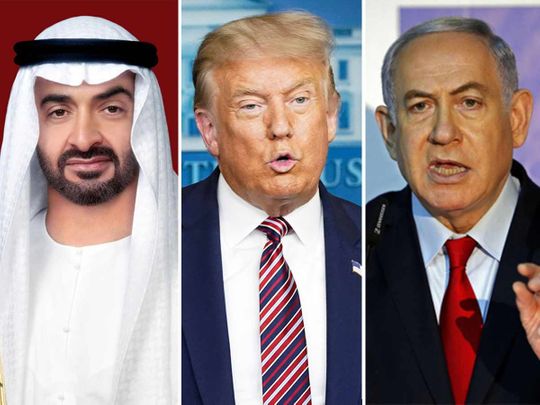From the Middle East comes the news: the United Arab Emirates declares the end of the economic boycott of Israel. The news is the first step after the announcement of the peace agreement between the Arab Emirates and Israel. The agreement announces the normalization of relations between the two countries in exchange for the suspension of Netanyahu’s plan to annex the territory in the West Bank. President Trump hailed the agreement as “historic” towards peace in the Middle East. But is this agreement really of such magnitude and why making it now?
This is the third agreement that an Arab country has made with Israel, after the peace treaty of Egypt in 1979, and that of Jordan in 1994. But this agreement cannot be called a peace deal. The Emirates are not at war with Israel, they do not share borders and certainly have no ongoing dispute. Indeed, it is no secret to anyone that ties between the Emirates and Israel have already existed for some time. Just to remind the UAE’s purchase of Israeli-made spyware to control their citizens. But the news, it must be said, took almost everyone by surprise, especially the Palestinians who at least should have been consulted and should have delegated the Emirates to speak for them. Suspending the annexation is actually suspending something that should never have happened. Israeli policy will continue to be the same with regard to settlements in the occupied territories, demolitions, and confiscations. Another figure is included in this story who is thought to have played a role in the agreement: Mohammad Dahlan. Dahlan is a former Palestinian security chief based in the Emirates. Expelled from the Palestinian territories, he became an adviser and intermediary for Emir Bin Zayed (MBZ). He handles business on behalf of MBZ not only in the Middle East but also in Serbia (in fact he has a Serbian passport). Mohamed Abbas sees him as a challenger for the National Palestinian leadership and from Ramallah, he is accused of confidential contacts with Israel and its security apparatus. Turkey has renewed the request to Interpol to arrest him. They accuse him of spying on behalf of the Emirates, of plotting against the Muslim Brotherhood in Egypt during the Morsi presidency, of acting together with the Gulenist movement during the attempted coup in July 2016.
All analysts think this agreement will pave the way for other Arab countries to follow suit. Oman and Bahrain could be the first followed by Morocco and Qatar. Israel has made it clear that it expects such a choice. Saudi Arabia may not arrive quickly, but the normalization of Saudi relations could take place indirectly through proxies. Israel’s openings to the Gulf countries are not recent. In 1995 Shimon Peres, at the time foreign minister visited Oman and Qatar, and again Oman two years ago hosted a visit by Israeli Prime Minister Benjamin Netanyahu raising many questions. From Europe, the first to congratulate were Spain, France and Germany and Egypt followed quickly.
The accelerator of relations between Israel and the Gulf countries is certainly the common enemy, Iran, and its rise and expansion in the Middle East. But in the case of the Emirates, perhaps even more important is Turkey with Erdogan and the Muslim Brotherhood. Nobody hates the Muslim Brotherhood like MBZ that pushed him to take sides against Turkey also in Libya.
With this agreement, Netanyahu finds a way out of the annexation quagmire and is fully aware that the benefits of normalization with an important Gulf State are greater than annexation and its consequences. Moreover, it can always follow the demolition and confiscation policy without giving the name of annexation. While Trump needed the agreement to bring an important event to the table before the election. Form the Emirates side, it was certainly a move to get in favor of the US whoever was the winner in the elections. If Trump wins, he would have given an agreement he needed to cover the failure of the Trump deal in the Middle East, and if Biden wins, good relations with Israel could help in the face of the Yemeni’s and Libyan’s situation.
What would the agreement bring to the two countries? In short, there are two advantages: strategic and technological. UAE gets an important new partner but also cooperation with Israel in the fields of agriculture, cybersecurity, and intelligence, health, technology, tourism. If this alliance works, it could push the UAE to a new level of international prestige thus also diversifying its network of alliances.
In conclusion, the agreement is certainly important seen by Trump and Netanyahu, as far as Iran is concerned, but also because it creates a psychological break above all. At this point, Arab States can normalize relations with Israel by choice even if they do not have conflicts, discords, or borders in common and without having to put the condition of the existence of the Palestinian State on the plate. It somehow brings to light a whole network of clandestine relations between Israel and many of the Arab States. And since no one foresees that the agreement could shake Bin Zayed’s power, perhaps it is an indication that the squares of the Arab countries have changed.
The two-state solution for the Palestinians is becoming increasingly unreachable and the one who gains the most is Hamas. The Arab peace process seems more distant than close. Not to mention two other unclear points: where will the Emirates base their Embassy the day they establish diplomatic relations? In Jerusalem? By writing in the agreement the sentence that Muslims “who come in peace” can visit Al Aqsa, the Emirates recognizes Israel’s sovereignty over the Islamic holy places?
Only time will prove the strength of this agreement which remains an important deal, but not a peace deal. Peace cannot be achieved without the involvement of the Palestinians. And it must be clear to them more than ever that they must take control of their own destiny.
Author
-

Researcher on International Relations Middle East and Balkans
View all posts
CSSII- Centro Interdipartimentale di Studi Strategici, Internazionali e Imprenditoriali,
Università di Firenze, Italy, Albania




